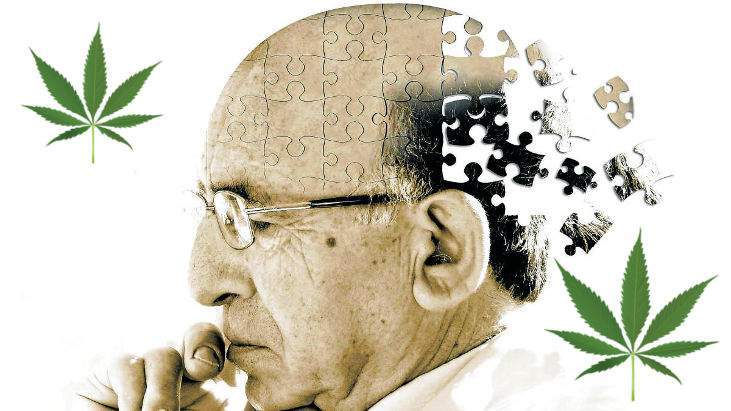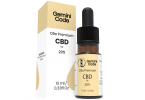 dementia that can be helped by CBD include: Alzheimer's disease, vascular dementia, dementia with Lewy bodies (DLB), Parkinson's disease, frontotemporal dementia, and Huntington's disease.
dementia that can be helped by CBD include: Alzheimer's disease, vascular dementia, dementia with Lewy bodies (DLB), Parkinson's disease, frontotemporal dementia, and Huntington's disease.According to researchers at the Salk Institute in California, their 2017 study found evidence that cannabinoids such as CBD could help significantly reduce dementia and increase connections between brain cells. These findings have been validated by other laboratories. As a result, the U.S. Food and Drug Administration approved a CBD-based drug for the treatment of epilepsy.
CBD can work to improve the status of people with dementia in 3 ways: it reduces inflammation, reduces oxygen accumulation, and works as a brain stimulator and neuroprotectant. For patients, CBD oil can reduce stress and anxiety in those with dementia and mitigate reductions in memory and other brain cell functions.
Alzheimer
'sThe health benefits continue to grow with new research on CBD as it relates to Alzheimer's
disease.In recent studies, it has been shown to reduce or eliminate inflammatory damage, oxygen accumulation, and brain cell decline. In contrast, inflammation has been confirmed to increase the negative impact of the disease. Inflammation that is a major cause of symptoms can often be reduced by using CBD oil.
Oxygen is released as a reactive and stress-induced component. When inflammation occurs in the brain, oxygen is released accordingly. The greater the inflammation, the greater the negative impact. Important brain functions such as memory are decreased when more oxygen is released into brain cells.
Memory loss and brain deterioration indirectly lead to increased oxygen in the brain. CBD, on the other hand, is an antioxidant, which helps reduce problems associated with oxygen stress. Brain functions negatively affected by oxygen stress can thus be improved by making use of it.
Patients' brain cells often show a path of rapid decline and destruction. The ability to stimulate brain tissue has recently been discovered as a potential benefit of CBD.
A 2011 study by Australian researchers Tim Karl and Carl Group found that it promotes the growth and development of brain cells, reducing the decline of memory and other brain functions.
Vascular dementia Vascular de
mentiais the generic term for describing problems with reasoning, planning, judgment, memory and other thought processes from brain damage due to altered blood flow to the brain.
To effectively treat vascular dementia, a 2016 study by the U.S. National Institute of Health (NIH) found that activating CB2 (cannabinoid) receptors in the brain helped restore better blood flow to the brain
dementia
Lewy body dementia (LBD) is a disease associated with abnormal deposits of a protein called alpha-synuclein in the brain. These deposits, called Lewy bodies, affect chemicals whose changes, in turn, can lead to problems with thinking, sleep, movement, behavior and mood.
Unlike most medications for pain, anxiety or behavior management, CBD does not block acetylcholine, the main chemical that attacks LBD.
Parkinson
's disease Parkinson's is a chronic disease of the nervous system that affects progressively, especially middle-aged and elderly people. It is linked to dopamine depletion with tremor, muscle rigidity, and slow and imprecise movements.
Digestive imbalance may also play a role in the progression and severity of symptoms. Cannabinoids such as CBD have been shown to contain effective brain protectors, antioxidants, and anti-inflammatory properties that may be helpful in managing the disease.
Frontotemporal Dementia/Pick's Disease
Frontotemporaldementia (FTD) or frontotemporal degeneration, is a group of disorders caused by chronic loss of nerve cells in the brain's frontal or temporal lobes, leading to symptoms of depression and psychosis.
Unlike most antipsychotic drugs, CBD does not lead to an increased risk of death. Research has shown that it can be an effective anti-inflammatory agent, reduce anxiety, reduce motor symptoms (tremor, rigidity, bradykinesis), and maintain circadian rhythms (sleep).
Huntington
's diseaseHuntington
'sdisease (HD), also called Huntington's còrea, is an inherited disease that kills brain cells. Early symptoms are often mild problems with mood or mental abilities. A general lack of coordination and an unsteady gait are often the following symptoms. According to 2016 research from the University of Madrid, due to CBD's effectiveness as an antioxidant and its anti-inflammatory properties, because it is safe and tolerable even at high doses, it can help manage Huntington's disease
.





